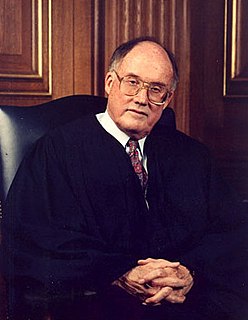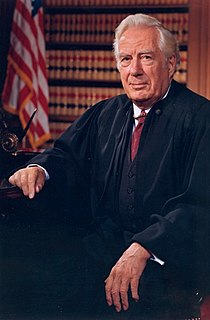A Quote by William Rehnquist
[I]f we assume a liberty interest but nevertheless say that, even assuming a liberty interest, a state can prohibit it entirely, that would be rather a conundrum.
Related Quotes
Religion and liberty are inseparable. Religion is voluntary, and cannot, and ought not to be forced. This is a fundamental article of the American creed, without distinction of sect or party. Liberty, both civil and religious, is an American instinct. Such liberty is impossible on the basis of a union of church and state, where the one of necessity restricts or controls the other. It requires a friendly separation, where each power is entirely independent in its own sphere.
The liberty I mean is social freedom. It is that state of things in which liberty is secured by the equality of restraint. A constitution of things in which the liberty of no one man, and no body of men, and no number of men, can find means to trespass on the liberty of any person, or any description of persons, in the society. This kind of liberty is, indeed, but another name for justice.
I see no other conceivable strategy for the achievement of liberty than political action. Religious or philosophical conversion of each man and woman is simply not going to work; that strategy ignores the problem of power, the fact that millions of people have a vested interest in statism and are not likely to give it up.... Education in liberty is of course vital, but it is not enough; action must also be taken to roll back the State.
As liberty of thought is absolute, so is liberty of speech, which is 'inseparable' from the liberty of thought. Liberty of speech, moreover, is essential not only for its own sake but for the sake of truth, which requires absolute liberty for the utterance of unpopular and even demonstrably false opinions.
...he said firmly, "God can help you. All the men I’ve seen in your position turned to Him in their time of trouble." "Obviously," I replied, "they were at liberty to do so, if they felt like it." I, however, didn’t want to be helped, and I hadn’t time to work up interest for something that didn’t interest me.
In all ages of the world, priests have been enemies to liberty; and it is certain, that this steady conduct of theirs must have been founded on fixed reasons of interest and ambition. Liberty of thinking, and of expressing our thoughts, is always fatal to priestly power, and to those pious frauds, on which it is commonly founded; and, by an infallible connexion, which prevails among all kinds of liberty, this privilege can never be enjoyed, at least has never yet been enjoyed, but in a free government.
The issue of religious liberty is absolutely critical. America was founded on three different types of liberty: political liberty, economic liberty, and religious and civil liberty. It's remarkable that, one-by-one, these strands of liberty are coming under fierce attack from the Left. And that's particularly ironic because "liberal" derives from a word which means "liberty," the free man as opposed to the slave. This liberalism which we're saddled with today isn't a real liberalism at all, but a gangster style of politics masquerading as liberalism.
Anarchism is for liberty, and neither for nor against anything else. Anarchy is the mother of co-operation, yes, just as liberty is the mother of order; but, as a matter of definition, liberty is not order nor is Anarchism co-operation. I define Anarchism as the belief in the greatest amount of liberty compatible with equality of liberty; or, in other words, as the belief in every liberty except the liberty to invade.

































